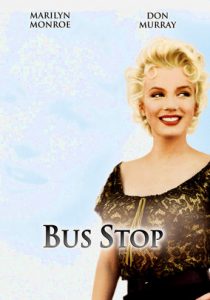Bus Stop-1956
Director Joshua Logan
Starring Marilyn Monroe, Don Murray
Scott’s Review #400
Reviewed April 30, 2016
Grade: C
Bus Stop is a 1956 film starring Marilyn Monroe that, while surprisingly ranking as one of her best roles, is one of her worst films in my opinion and, at present times, feels dated, chauvinistic, and diminishing to women.
Perhaps perceived as romantic and cute in 1956, times have changed, and the film no longer has the charm it undoubtedly must have had decades ago.
The film is based on a play by William Inge and, remarkably, is Monroe’s first full-fledged dramatic performance. She plays a nightclub performer named Cherie or mispronounced “cherry” by her love interest, Beau, an immature, naïve, socially inept cowboy, unfamiliar with women, and looking for his “angel”.
He is accompanied by his friend and father figure, Virgil.
Together, they travel by bus for a rodeo from Montana to Phoenix, Arizona. Once Beau meets Cherie, he conquers and marries her despite her resistance to his pursuits.
As a fan of Monroe’s more familiar works- Gentlemen Prefer Blondes (1953) and How To Marry A Millionaire (1953), it is nice to see her in a dramatic role, giving her some nice range and meatier material to tackle.
In 1956, she still looked marvelous, and the sexy nightclub outfit she wore while prancing around in the film worked well.
While Monroe will never be accused of being the most excellent actress in the world, her performance in this film is to be praised. She expresses some lovely emotions. Unfortunately, the character is poorly written, but Monroe gives it the old college try.
Another positive aspect of the film is that of the supporting cast.
Bus stop owner Grace (Betty Field), who has a suggested affair with the bus driver (Robert Bray), is a delight and nearly steals the show! I found their limited screen time and limited romance more interesting and fraught with more potential than the main couple (Beau and Cherie).
Eileen Heckert is acceptable as Vera, Cherie’s waitress and confidante, though she is given little to do.
My favorite scene is at Grace’s Bus Stop as the group is stranded during a sudden winter storm. Beau and the bus driver engage in a bare-knuckles fight outdoors in the driving snow while the rest look on. The bus driver is tired of Beau’s obnoxiousness and intends to teach him a lesson.
Despite being on a sound stage, the scene is authentic, and the snow and gusts add to the animal-like, masculine scene.
Otherwise, the film is not kind to women and, in some parts, is downright sexist. When Cherie, clearly rebuffing Beau’s advances, attempts to board a bus out of town (and alone), Beau decides to lasso her to prevent her from leaving.
In the next scene, Cherie obediently sits beside Beau on another bus to Phoenix to marry him. It is suggested that she finally gives in, temporarily, to his advances.
This film would never be made today.
The character of Beau is not well crafted. Dumb, lower class, and bordering on abusive to Cherie, I am perplexed as to why the audience should root for this character to obtain Cherie and ride off happily into the sunset- I certainly did not.
I would have preferred a pairing of Cherie and Virgil, who are older, sensible, and kind.
Dated, sexist, and poorly written characters, Bus Stop (1956) is not Monroe’s best film, but it allows an audience to see her in a dramatic role that is worth a viewing.
Oscar Nominations: Best Supporting Actor-Don Murray
